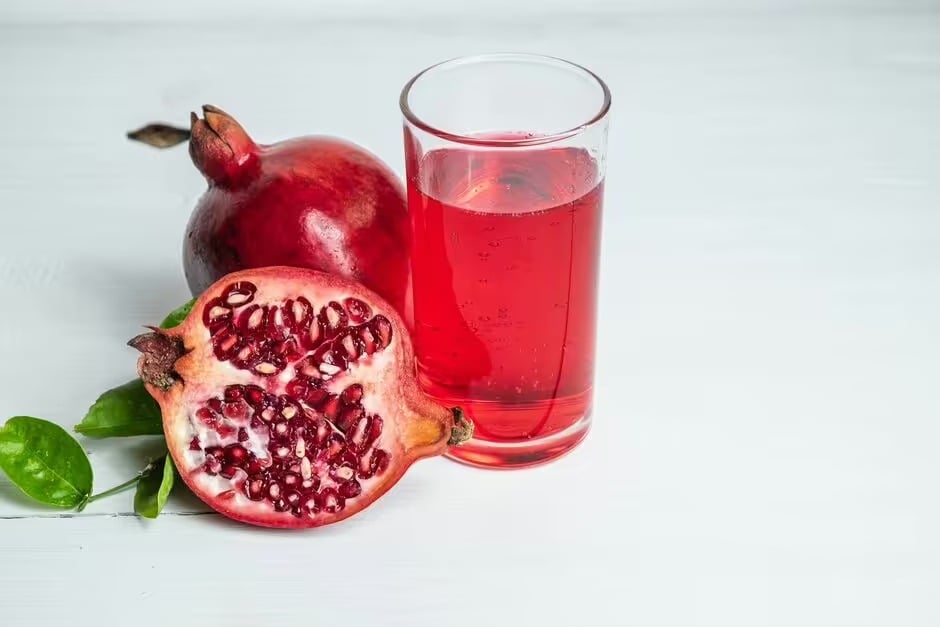Pomegranate juice may help prevent the buildup of plaque in arteries and improve blood circulation. Here’s the science behind this benefit.
A ruby-red drink may hold the key to maintaining a healthy heart, according to research. Pomegranate juice, known for its tangy taste and vibrant color, is more than just a refreshing beverage; it’s a “superfood” packed with health benefits.
Pomegranate juice is rich in antioxidants that protect LDL cholesterol from oxidation—a factor that can lead to plaque formation. Plaque buildup in the arteries is a serious concern as it narrows and hardens them, restricting blood flow and increasing the risk of heart attacks or strokes.
Plaque can also rupture, leading to the formation of blood clots that block blood vessels. Experts believe that pomegranates may aid in preventing cardiovascular disease through various mechanisms, such as:
What does the research say?
According to Express, studies indicate that the antioxidants in pomegranates can prevent plaque formation in arteries and even reduce existing plaque. This finding comes from Professor Michael Aviram, a biochemist at the Technion-Israel Institute of Technology, as reported by Surrey Live.
Aviram’s research demonstrates that pomegranate antioxidants can combat oxidized cholesterol, a contributor to arterial blockages. Other studies also emphasize that pomegranate juice improves blood circulation and prevents atherosclerosis, which is crucial in averting cardiovascular disease.

While completely reversing arterial blockages is challenging, adopting a healthy lifestyle, along with medical support, can slow plaque buildup and improve cardiovascular health. This includes a healthy diet, regular exercise, quitting smoking, and managing stress. In some cases, medication or medical procedures may be necessary.
Drinking pomegranate juice consistently can be a positive turning point for cardiovascular health, with small studies suggesting that this juice can significantly lower bad cholesterol levels. However, the National Institutes of Health (NIH) cautions that research on the cardiovascular benefits of this super fruit is still in its early stages.
The journal Clinical Nutrition published a study showing that individuals who drank pomegranate juice daily for a year experienced a significant reduction in arterial plaque. These participants had a 30% decrease in carotid artery thickness, while the placebo group showed a 9% increase.
The researchers stated, “Systolic blood pressure decreased by 12% after one year of pomegranate juice consumption and did not decrease further during the next three years.” The polyphenols in pomegranates are likely responsible for these impressive results.
Polyphenols are the source of pomegranates’ antioxidant power, and they are also believed to improve cardiac and vascular endothelial function.
The researchers emphasized, “Drinking pomegranate juice in patients with carotid artery stenosis reduced carotid artery thickness and systolic blood pressure.” They attributed these effects to the “potent antioxidant properties of polyphenols in pomegranate juice.”
A 2017 review in the journal Pharmacological Research, analyzing eight clinical trials, found that pomegranate juice could decrease both systolic and diastolic blood pressure, with the effect being consistent regardless of the dosage. The authors recommended including this juice in a heart-healthy diet.
Despite promising findings, some experts believe that pomegranate juice does not significantly impact cholesterol levels.
A 2019 review in Complementary Therapies in Medicine, which synthesized 17 different studies, concluded that pomegranate juice did not significantly affect cholesterol. This inconsistency may be due to variations in study design and dosage.
Why is pomegranate good for health?
Pomegranates are highly regarded for their rich content of antioxidants such as tannins, flavonoids, and anthocyanins—compounds that neutralize free radicals and protect cells from damage. The antioxidants in pomegranates may also help prevent and repair DNA damage, thereby reducing the risk of certain cancers.
Pomegranates could be the “secret weapon” for maintaining a healthy heart as they help prevent atherosclerosis and plaque buildup, improving blood circulation. Additionally, pomegranates may aid in lowering blood pressure, a key factor in safeguarding cardiovascular health.
This vibrant red fruit also contains compounds that reduce systemic inflammation, especially beneficial for those facing chronic inflammatory diseases or seeking to control inflammation within the body.
The Four Hourly Showers to Avoid: A Guide to Healthy Hair Care
“Superstitions surrounding the timing of hair washing are prevalent in many cultures, with certain hours of the day deemed inauspicious. These beliefs hold that washing your hair during these hours can lead to adverse health effects, including an increased risk of stroke. However, it’s important to separate fact from fiction. While maintaining a healthy hair care routine is important, there is no scientific evidence linking hair washing to an increased propensity for strokes. So, feel free to wash your locks whenever suits your schedule, and rest assured that your health is not at risk from this age-old superstition.”
“6 Amazing Health Benefits of Drinking Bitter Gourd Juice”
Bitter gourd juice is a nutritional powerhouse, offering a plethora of health benefits. This humble vegetable boasts an impressive nutritional profile, packed with essential vitamins and minerals that support overall wellness. From boosting immunity to regulating blood sugar, bitter gourd juice is a natural remedy with numerous advantages. Discover the fascinating world of bitter gourd juice and explore the myriad ways it can enhance your health and well-being.





































